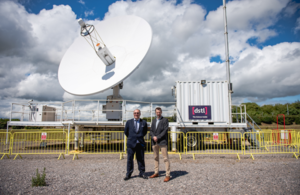Report outlines youth-centred framework to build a more confident and inclusive Northern Ireland
Press release
Wilton Park publishes report reflecting on the dialogue between participants at a special conference looking ahead to the 25th anniversary of the Belfast (Good Friday) Agreement.

- Youth-focused recommendations published following first-of-its-kind conference on achieving a more confident and inclusive Northern Ireland, looking forward to the Belfast (Good Friday) Agreement’s 25th anniversary.
- Conference highlighted importance of supporting a culture of empathy, continued and sustained integration in all aspects of society, and entrepreneurial ambition to achieve a brighter future for Northern Ireland’s young people.
- Participants agreed that the public, third and private sectors should better involve young people in decision making, so they have a greater say in Northern Ireland’s future.
Wilton Park today published a report reflecting on the open and constructive dialogue between participants at a special conference on a more confident and inclusive Northern Ireland, held in partnership with the Northern Ireland Office and the Foreign, Commonwealth and Development Office.
The conference was convened looking ahead to the 25th anniversary of the Belfast (Good Friday) Agreement in April 2023. It brought together young people with politicians and representatives from the public sector, academia, peace-building organisations, and youth workers to consider the conditions needed to build a fair, prosperous and vibrant future for all.
Participants reflected on the extraordinary transformation Northern Ireland has undergone over the last quarter century, and shared ideas on how Northern Ireland can reach its potential, with a focus on the role of young people.
These ideas included:
- Ensuring that children and young people from all backgrounds are included in decision-making processes – participants also called on business and civic society to be more proactive in their youth engagement.
- Longer-term investments and improvements in education, in particular to support greater integration through education.
- Developing empathy skills, including via the education and skills system to support a more stable and just society.
- Work to attain a more confident and inclusive society is something that begins in very early stages of life, and can be supported by early years interventions.
- Instilling a sense of entrepreneurial ambition within young people would retain talent and support Northern Ireland’s future economic prosperity.
Looking forward, the conference concluded that the Belfast (Good Friday) Agreement’s upcoming 25th anniversary presents a strong opportunity to share Northern Ireland’s success story with the world – with a particular focus on promoting its innovative economy, cultural prowess and creativity, and areas of natural beauty.
Minister of State for Northern Ireland, Conor Burns, who attended the conference, said:
This report really captures the positive and uplifting discussions that were had at Wilton Park.
Bringing together young voices and decision makers is so crucial in political debate, and I was inspired to hear fresh thinking to help us achieve a more confident and inclusive Northern Ireland with long-term peace and prosperity.
As we move closer to the 25th anniversary of the Belfast (Good Friday) Agreement, it is more important than ever to encourage individuals from all walks of life to engage in dialogue so that we may build an even brighter future.
In support for greater integration through education, the UK government has recently announced a £1.9m funding package to support schools through the transformation process towards integrated status.
Notes to editors
-
The report is available to download. As the conference was held under the Chatham House Rule, conference participants are not identified: https://www.wiltonpark.org.uk/reports/
-
Wilton Park was established as part of an initiative inspired by Winston Churchill to help re-establish peace and democracy in Europe in the aftermath of the Second World War. Discussions on how to promote peace, reconciliation and understanding have been a core mandate of Wilton Park ever since. Find out more about the conference at: www.wiltonpark.org.uk/event/a-more-confident-and-inclusive-northern-ireland/
Published 4 August 2022
